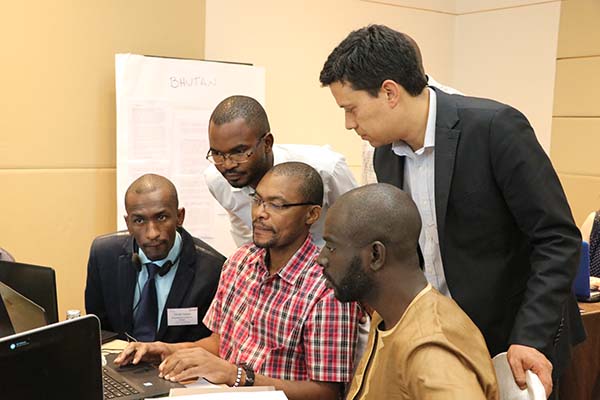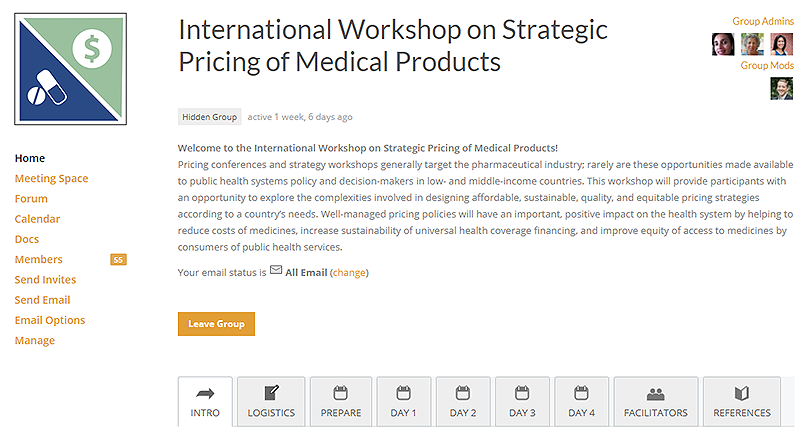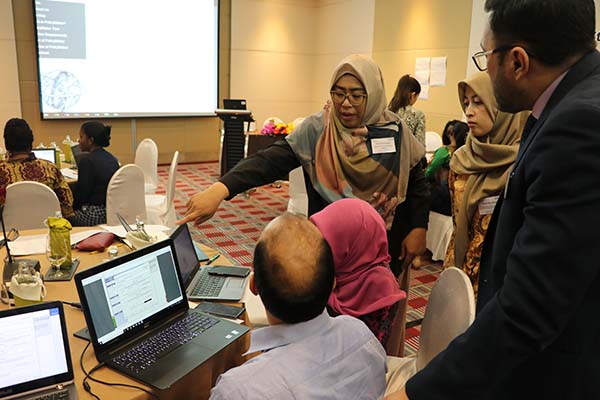Our Blended Learning Experience in Thailand


In collaboration with the Access and Delivery Partnership (ADP), MSH recently used LeaderNet in a face-to-face workshop setting. As the Course Coordinator, I greatly appreciated the ease with which we could change PowerPoints, case studies and other materials to suit the needs of participants and the participants liked LeaderNet’s easy-to-access layout. They quickly became accustomed to asking “Is this on LeaderNet?” Our funders appreciated the fact that all materials were easily found in one place, calling it a “well-organized, robust” platform for accessing workshop products.
Led by Dr. Hector Castro, MSH’s Senior Technical Director Pharmaceutical Economics & Financing, the International Workshop on Strategic Pricing of Medical Products brought participants together from around the world, including Senegal, Bhutan, Ghana and Thailand. For all of us, LeaderNet provided a “one-stop shop” for information and materials, before, during and after the workshop.

By design: We knew that the workshop would have to pivot quickly to respond to the needs of the participants, and I anticipated the need to adapt materials on-the-spot. I also knew that the traditional, paper-based system of providing handouts and other references would be clunky and inefficient in this setting, and was glad when MSH offered the use of LeaderNet for this application. The workshop had several subject matter experts covering a range of topics. I worked with them and the LeaderNet team to ensure that there was a seamless interface between the electronic platform and the face-to-face forum which led to some interesting innovations in linking LeaderNet with Google Forms, Spreadsheets, Docs and PDFs.

Before the workshop, our hosts in Bangkok, the Access and Delivery Partnership, provided me with information about the venue, arrival and departure times and free-time activities. We posted that information along with session abstracts, the workshop agenda, and facilitator biographies, all of which participants were able to access in advance of their arrival. This led to a quicker orientation process, especially for those who were traveling from out-of-country.
Along with MSH colleagues, I created Google Forms that contained pre- and post-tests, daily evaluations and a workshop evaluation; we linked those to the LeaderNet platform so that, with one click, participants were able to complete them when requested. This resulted in an almost 100% completion and submission rate, something that is hard to replicate when using paper-based forms. In addition, using Google Forms allowed me to adapt evaluation questions based on the content covered during sessions and then to share instantaneous response results, including visualizations, with team members. This helped us quickly make adjustments to workshop content and processes – and meant very little time was required to read and compile dozens of paper-based evaluations.
During the workshop, when facilitators needed to adapt their presentations and other workshop content, they were able to do so without any disruption to the participants’ experience. Facilitators sent their modifications to me and I coordinated with the LeaderNet team to have them uploaded to the platform. As soon as participants logged into the day’s sessions, they had full access to updated presentations, databases, and other materials without ever knowing that there had been behind-the-scenes changes. For me, keeping the workshop setting free from those types of distractions is an important (and valuable) part of maintaining a focused learning environment.
Even after the workshop concluded, LeaderNet will remain accessible to all participants. MSH will moderate conversations on topics that sparked their interest and moderators will check in to see if they have been able to make progress on the action plans that they developed during the workshop.

Workshop organizers recognize that there are many virtual workshop resources available to the global health community. I strongly believe that combining LeaderNet’s user-friendly interface and its virtual learning features with person-to-person interactions during the workshop contributed to the success of this workshop. Additionally, by joining the LeaderNet community, workshop participants gain immediate access to other global health resources available on LeaderNet.
To contact me about the workshop and my experience using LeaderNet, message me on my LeaderNet profile. For more information on how to use LeaderNet as a “one-stop shop” for your workshop, contact [email protected]
Workshop photos by Ian Mungall/UNDP
About the Author

Ms. Beth Gragg has over two decades of experience in assessing learning needs, designing, facilitating and evaluating participatory training programs for NGOs and other not-for-profits in Africa, Asia, Latin America, the former Soviet republics and the United States. She works with subject matter experts to develop training programs in public health in HIV & AIDS prevention, maternal child and reproductive health, monitoring and evaluation, emergency settings, and management skills. She is adept in a variety of learning platforms, including face-to-face, web-based and blended delivery systems and she is known for her excellent facilitation skills. She is the author of Tools from the Field: Participant-Centered Techniques for More Effective Training; she holds an advanced degree in adult education and is fluent in English and Spanish.
Beth is an independent consultant who can be reached at [email protected]




HI @ninapruyn! I’m sure that you’ll get the chance to see LeaderNet used for pre-work. Good to start somewhere!
I’m thrilled to hear about such a positive blended learning experience using LeaderNet! This really showcases how a platform like LeaderNet can be used to enhance the learning experience and make resources available in an efficient and user-friendly manner. I would also like to see a blended learning course that includes virtual pre-work, i.e. an elearning course or webinar series, that prepares participants prior to a face-to-face workshop as part of the comprehensive learning event. In my experience, virtual pre-work can be invaluable in setting the stage, transferring knowledge, and putting participants on a more level playing field prior to the face-to-face work where skills can be developed based on such a foundation. I love the use of the platform for all the materials and evaluations as well! Congratulations!